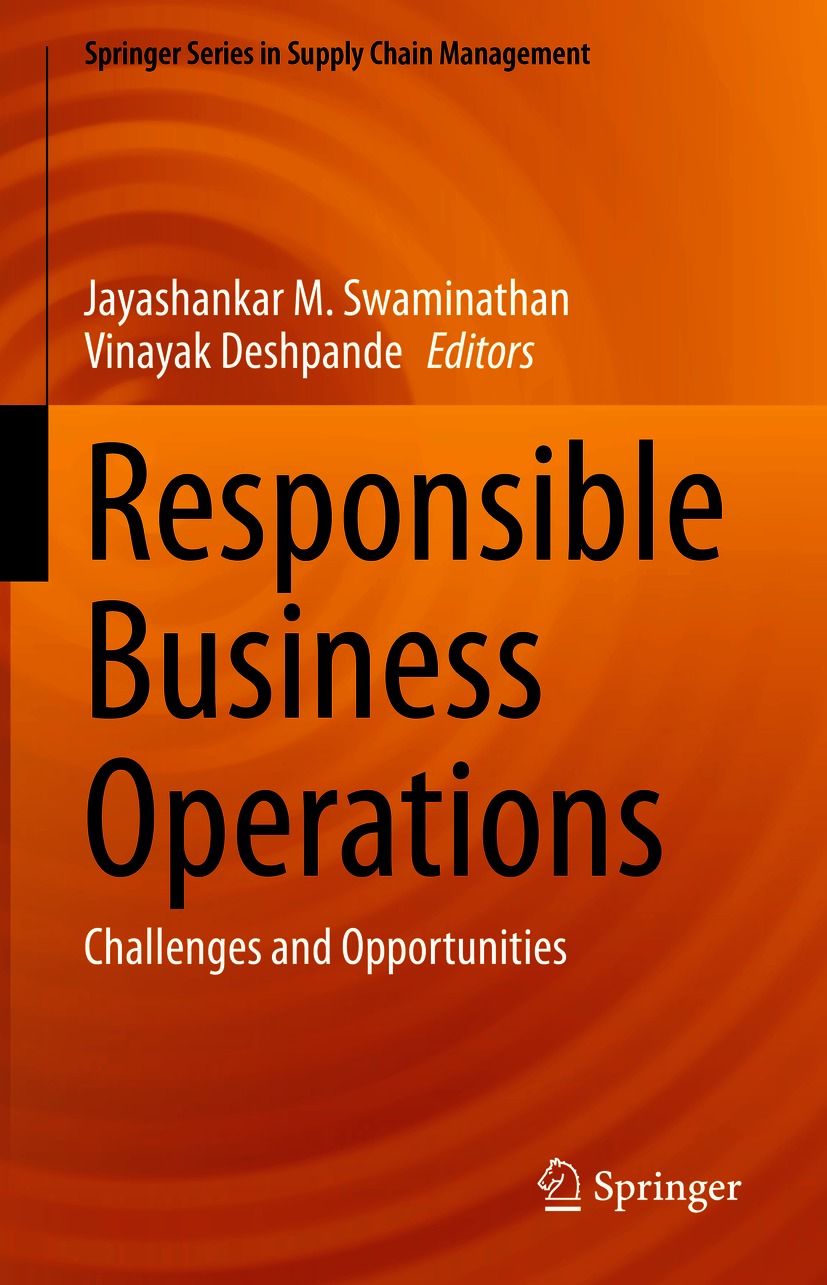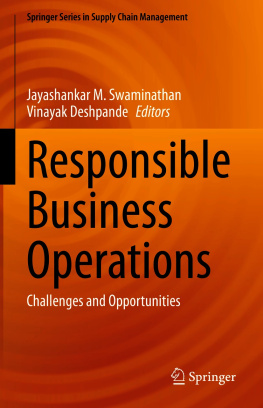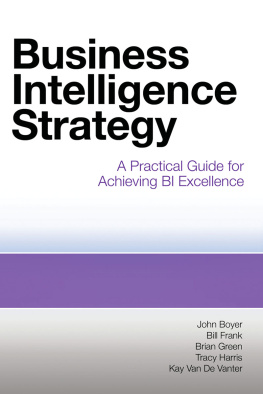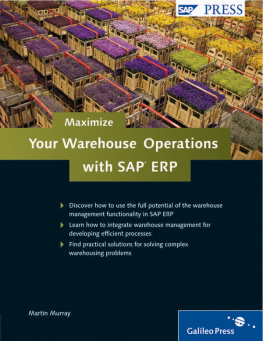Jayashankar M. Swaminathan - Responsible Business Operations: Challenges and Opportunities
Here you can read online Jayashankar M. Swaminathan - Responsible Business Operations: Challenges and Opportunities full text of the book (entire story) in english for free. Download pdf and epub, get meaning, cover and reviews about this ebook. year: 2021, publisher: Springer International Publishing, genre: Politics. Description of the work, (preface) as well as reviews are available. Best literature library LitArk.com created for fans of good reading and offers a wide selection of genres:
Romance novel
Science fiction
Adventure
Detective
Science
History
Home and family
Prose
Art
Politics
Computer
Non-fiction
Religion
Business
Children
Humor
Choose a favorite category and find really read worthwhile books. Enjoy immersion in the world of imagination, feel the emotions of the characters or learn something new for yourself, make an fascinating discovery.
- Book:Responsible Business Operations: Challenges and Opportunities
- Author:
- Publisher:Springer International Publishing
- Genre:
- Year:2021
- Rating:3 / 5
- Favourites:Add to favourites
- Your mark:
- 60
- 1
- 2
- 3
- 4
- 5
Responsible Business Operations: Challenges and Opportunities: summary, description and annotation
We offer to read an annotation, description, summary or preface (depends on what the author of the book "Responsible Business Operations: Challenges and Opportunities" wrote himself). If you haven't found the necessary information about the book — write in the comments, we will try to find it.
Responsible Business Operations: Challenges and Opportunities — read online for free the complete book (whole text) full work
Below is the text of the book, divided by pages. System saving the place of the last page read, allows you to conveniently read the book "Responsible Business Operations: Challenges and Opportunities" online for free, without having to search again every time where you left off. Put a bookmark, and you can go to the page where you finished reading at any time.
Font size:
Interval:
Bookmark:

More information about this series at http://www.springer.com/series/13081 Supply Chain Management (SCM), long an integral part of Operations Management, focuses on all elements of creating a product or service, and delivering that product or service, at the optimal cost and within an optimal timeframe. It spans the movement and storage of raw materials, work-in-process inventory, and finished goods from point of origin to point of consumption. To facilitate physical flows in a time-efficient and cost-effective manner, the scope of SCM includes technology-enabled information flows and financial flows.
The Springer Series in Supply Chain Management, under the guidance of founding Series Editor Christopher S. Tang, covers research of either theoretical or empirical nature, in both authored and edited volumes from leading scholars and practitioners in the field with a specific focus on topics within the scope of SCM.
Springer and the Series Editor welcome book ideas from authors. Potential authors who wish to submit a book proposal should contact Ms. Jialin Yan, Associate Editor, Springer (Germany), e-mail: jialin.yan@springernature.com

This Springer imprint is published by the registered company Springer Nature Switzerland AG
The registered company address is: Gewerbestrasse 11, 6330 Cham, Switzerland
With the increase in climate emergency, global social inequalities, and a need to develop rural agricultural systems, there is an increased focus on developing responsible business models. Operations plays an integral role in delivering value to any business model; therefore, at present, there is an increased emphasis on responsible operations. The Brundtland commission defines sustainable development as development that meets the needs of the present without compromising the ability of future generations to meet their own needs. There are many dimensions of sustainability which are often captured through triads such as the three Es (Economics, Environment, and Equity) or the three Ps (Profit, Planet, and People). Responsible operations includes workforce, environmental, as well as social impact. For example, Goodyear Corporation states responsible operations includes our day to day efforts to produce high quality products in an efficient manner supported by a culture of health and safety. It also includes managing our environmental impacts. Operating in a responsible manner worldwide leads to protecting our people, our customers/consumers and the planet.
Operations management is defined as the design, operation, and improvement of the systems that create and deliver a firms primary products and services. The operations function of a firm focuses on adding value through the transformation process of converting inputs to outputs. Since operations has an effect on the value delivery process, from design to procurement to production to delivery, there is tremendous opportunity for firms to make progress on their responsibility mandate through their operations. While firm level corporate responsibility is important, there is also a great need for governments and international agencies to innovate their models of execution to promote development, growth, and inclusion across the world. This book presents a collection of recent innovative research and ideas around responsible operations from leading researchers of the world. In particular, it focusses on two important themes: (1) development of emerging economies and addressing the needs of the bottom of the pyramid and (2) developing responsible practices both within and outside the firm.
Along the first theme, the chapter titled Value Chain Innovations to Foster Development by Hau Lee discusses five effective ways to develop innovation strategies for emerging economies. These includemobilizing ecosystems, product and process innovation, designing the right value chain, leveraging geopolitical lubricants, and servicization. This is followed by the chapter titled The Impact of Crop Minimum Support Prices (MSP) by Tang and Chintapalli, which presents alternative models of support prices. By examining the dynamic interactions among farmers for the case when there are two (complementary or substitutable) crops for each farmer to select and grow, it is revealed that regardless of the values of the MSP, price disparity between the crops worsens as complementarity between them increases. Another finding is that offering MSP is not always beneficial to farmers. In fact, offering MSP for a crop can hurt the profit of those farmers who grow that crop especially when the proportion of strategic farmers is sufficiently small. This followed by the chapter titled Improving Crop Yield: A Model for Plant Growth and Optimal Seeding by Swaminathan and Zhang, the authors present an innovative model of plant growth and embed that in an optimization framework to study a farmers planting schedule problem under rainfall uncertainty and planting capacity constraint. They establish the optimal planting schedule given the soil water content, planting capacity, and future rainfall uncertainty. In their computational study, they use field weather data from Southern Africa in a real-size large-scale problem and demonstrate significant relative crop production advantage of the optimal planting schedule over commonly used heuristics in practice. Following this chapter, in the one titled The Role of Donors in Global Health Supply Chains, Rashkova and Berringer discuss the important role of funding in enabling development and capacity building in emerging countries of the world. They use the global health supply chains to provide the context and utilize that to highlight the shortcomings and potential opportunities. Finally, in the chapter titled Prepositioning Inventories at UNCEF, Swaminathan et al. describe the benefits of utilizing inventory prepositioning and postponement strategies in the Horn of Africa for PlumpyNut supply chain. They describe the costs, benefits, as well as challenges in implementing such an approach.
Font size:
Interval:
Bookmark:
Similar books «Responsible Business Operations: Challenges and Opportunities»
Look at similar books to Responsible Business Operations: Challenges and Opportunities. We have selected literature similar in name and meaning in the hope of providing readers with more options to find new, interesting, not yet read works.
Discussion, reviews of the book Responsible Business Operations: Challenges and Opportunities and just readers' own opinions. Leave your comments, write what you think about the work, its meaning or the main characters. Specify what exactly you liked and what you didn't like, and why you think so.











